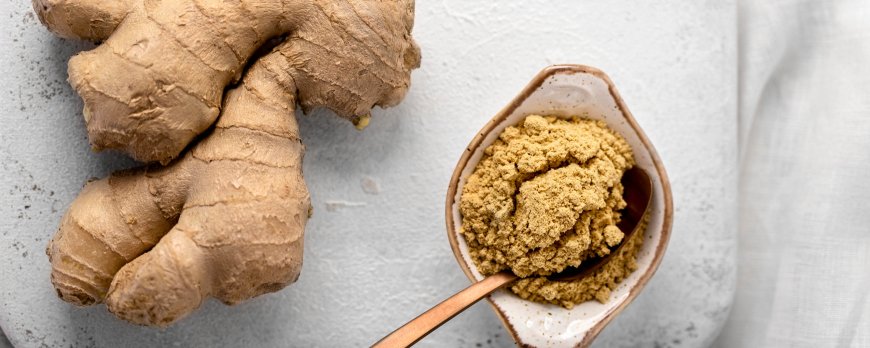Does turmeric help with weight loss?
Explore the answer to 'Does turmeric help with weight loss?' as we unveil the potentials of this ancient spice in modern weight management strategies.

Does Turmeric Help with Weight Loss?
Turmeric has gained popularity for its potential role in weight loss, but does it really help shed those extra pounds? In this section, we will explore the benefits of turmeric, examine the existing research on its effects on weight loss, and review user experiences in using turmeric for weight management.
Key Takeaways:
- Turmeric, specifically its compound curcumin, has shown potential in suppressing inflammatory markers associated with obesity and promoting weight loss in animal studies.
- A study in humans found that supplementing with curcumin led to significant reductions in body weight, body mass index, and waist and hip circumference.
- However, more research is needed to fully understand the effects of turmeric on weight loss in humans.
- Consuming excessive amounts of turmeric can pose health risks and may cause symptoms such as upset stomach, diarrhea, and acid reflux.
- Individuals with gallbladder issues, bleeding disorders, and diabetes should use caution when consuming turmeric.
- Turmeric supplements may interact with certain medications, so it's best to consult with a healthcare provider before starting any new weight loss regimen.

Turmeric's Impact on Weight Loss: What Does Research Say?
Numerous studies have investigated the potential benefits of turmeric on weight loss, shedding light on its impact on fat metabolism and body composition.
Research has shown that curcumin, the active compound in turmeric, has anti-inflammatory properties that may aid in weight loss. Inflammation is believed to play a role in obesity, and by reducing inflammation, turmeric may help promote weight loss. A study conducted on animals found that curcumin supplementation led to a decrease in body weight and fat mass. Furthermore, curcumin has been shown to enhance fat metabolism, which can contribute to weight loss.
In a human study, participants who supplemented with curcumin experienced significant reductions in body weight, body mass index, and waist and hip circumference compared to those who took a placebo. These findings suggest that turmeric may have potential as a natural weight loss aid.
However, it is important to note that more research is needed to fully understand the effects of turmeric on weight loss in humans. Additionally, consuming excessive amounts of turmeric can pose health risks and may cause symptoms such as upset stomach, diarrhea, and acid reflux. Individuals with certain medical conditions, including gallbladder issues, bleeding disorders, and diabetes, should exercise caution when incorporating turmeric into their diet. It is always recommended to consult with a healthcare provider before starting any new weight loss regimen that includes turmeric supplements.

Supplementing with Turmeric for Weight Loss: What Do Reviews Say?
User reviews provide valuable insights into the effectiveness of turmeric supplements for weight loss, allowing us to understand the experiences of those who have incorporated turmeric into their weight management regimens. Many users report positive results when using turmeric supplements as part of their weight loss journey.
One of the commonly reported benefits of turmeric supplements is its ability to aid in appetite control. Users often mention feeling more satisfied after meals and experiencing reduced cravings for unhealthy snacks. This can be attributed to turmeric's potential role in regulating blood sugar levels and promoting a sense of fullness.
Additionally, some users have noticed improvements in their overall body composition when using turmeric supplements. They report a decrease in body fat percentage and an increase in lean muscle mass. This could be due to turmeric's potential impact on metabolism and fat metabolism, as suggested by preliminary research.
Some key findings from user reviews include:
- Increased energy levels and improved stamina, which can be beneficial for maintaining an active lifestyle and supporting regular exercise routines.
- Improved digestion and reduced bloating, which may contribute to a flatter stomach and a more comfortable overall feeling.
- Enhanced mood and reduced feelings of stress, which can be important factors in managing emotional eating and maintaining a healthy relationship with food.
However, it is essential to note that individual experiences may vary, and turmeric supplements should not be viewed as a magical solution for weight loss. It is always recommended to combine the use of turmeric supplements with a balanced diet and regular exercise for optimal results. Additionally, consulting with a healthcare provider before starting any new weight loss regimen is recommended, especially for individuals with underlying medical conditions or who are taking medications.

Turmeric and Inflammatory Markers: A Potential Link to Weight Loss
Researchers have investigated the potential connection between turmeric and weight loss, with a particular focus on its impact on inflammatory markers associated with obesity. Turmeric contains a compound called curcumin, which has been shown to possess anti-inflammatory properties. Studies have suggested that curcumin may help reduce the production of certain inflammatory markers that are linked to obesity.
Animal studies have demonstrated promising results, showing that curcumin supplementation can suppress the activation of inflammatory pathways in fat cells and reduce the production of pro-inflammatory substances. These findings suggest a potential link between turmeric, curcumin, and weight loss.
However, it's important to note that while these preclinical studies show promise, more research is needed to fully understand the effects of turmeric on weight loss in humans. It remains unclear how much turmeric or curcumin is necessary to achieve significant weight loss results, and the mechanisms through which they exert their effects.
Further Research and Considerations
- Researchers are working to conduct clinical trials to better understand the potential benefits of turmeric in promoting weight loss and how it may affect inflammatory markers in humans.
- It's important to incorporate turmeric as part of a balanced and healthy diet and lifestyle, rather than relying solely on its potential weight loss benefits.
- Individuals considering turmeric supplementation for weight loss should consult with a healthcare provider to ensure it is safe and appropriate for their specific circumstances, especially if they have any underlying medical conditions or are taking medications that may interact with turmeric supplements.
In conclusion, while early research suggests a potential link between turmeric, curcumin, and weight loss through their effects on inflammatory markers, more studies are needed to fully understand the benefits and mechanisms involved. It's best to approach turmeric as a part of a varied and balanced diet, as well as to consult with a healthcare provider before starting any new weight loss regimen.
Turmeric and Metabolic Rate: Understanding the Relationship
The metabolic rate plays a crucial role in weight management, and we will examine how turmeric may impact this important aspect of our body's functioning. Turmeric contains a compound called curcumin, which has been found to have various potential health benefits, including its effects on metabolism. Let's take a closer look at the potential relationship between turmeric and metabolic rate.
1. Turmeric and Thermogenesis: Thermogenesis is the process by which our body generates heat and burns calories. Some studies suggest that curcumin may increase thermogenesis in the body, which can contribute to a higher metabolic rate. This means that turmeric may help increase the number of calories your body burns, potentially aiding in weight management.
2. Turmeric and Fat Oxidation: Fat oxidation refers to the breakdown of fat molecules for energy. Research indicates that curcumin may enhance fat oxidation, leading to a more efficient use of stored fat as an energy source. By increasing the rate at which your body burns fat, turmeric may indirectly support weight loss efforts.
3. Turmeric and Insulin Sensitivity: Insulin is a hormone that regulates blood sugar levels. Poor insulin sensitivity can lead to weight gain and metabolic disorders. Some studies suggest that curcumin may improve insulin sensitivity, which can promote a healthier metabolic rate. By enhancing insulin sensitivity, turmeric may help regulate blood sugar levels and potentially aid in weight management.
Conclusion
While the potential relationship between turmeric and metabolic rate is promising, it's important to note that more research is needed to fully understand the effects of turmeric on weight management. Turmeric supplements and incorporating turmeric into your diet may have some potential benefits, but it's crucial to practice moderation and consult with a healthcare provider, especially if you have any underlying medical conditions or are taking medications. As with any dietary changes or supplements, individual results may vary, so it's always wise to approach weight loss with a comprehensive and balanced approach.

Understanding the Potential Health Risks of Turmeric
While turmeric offers potential benefits for weight management, it is essential to understand and be aware of the potential health risks associated with its use. Consuming excessive amounts of turmeric can lead to adverse effects on the digestive system, including upset stomach, diarrhea, and acid reflux. It is important to use turmeric in moderation and be mindful of your body's tolerance.
Potential Health Risks:
- Gallbladder Issues: Individuals with gallbladder problems should exercise caution when consuming turmeric as it can trigger gallbladder contractions, leading to discomfort or pain.
- Bleeding Disorders: Turmeric has natural blood-thinning properties, so people with bleeding disorders or taking blood-thinning medications should use turmeric with caution to avoid excessive bleeding.
- Diabetes: Turmeric may lower blood sugar levels, so individuals with diabetes should monitor their blood sugar closely and consult with a healthcare provider before incorporating turmeric into their diet or supplement regimen.
Furthermore, if you are considering turmeric supplements for weight management, it is important to be aware of potential interactions with medications. Turmeric supplements may interact with certain drugs, including antiplatelet medications, anticoagulants, and drugs that reduce stomach acid. Consulting with a healthcare provider is crucial before starting any new weight loss regimen that includes turmeric supplements to ensure safe and effective usage.
In conclusion, while turmeric offers promising potential benefits for weight management, it is necessary to approach its use with caution. Understanding the potential health risks associated with turmeric, particularly for individuals with specific medical conditions, is essential to ensure safe and effective usage. Moderation, consultation with healthcare professionals, and monitoring your body's response are key steps towards harnessing the potential benefits of turmeric for weight management.
Considerations for Individuals with Medical Conditions
Individuals with specific medical conditions need to exercise caution and consult with a healthcare provider before incorporating turmeric into their weight loss journey. While turmeric has been associated with potential weight loss benefits, it's important to consider potential risks and interactions with certain conditions.
If you have gallbladder issues, such as gallstones or a history of gallbladder disease, it's essential to speak with your healthcare provider before using turmeric for weight management. Turmeric can stimulate the production of bile, which may exacerbate symptoms or complicate existing conditions.
For individuals with bleeding disorders or taking blood-thinning medications, turmeric may interfere with the body's ability to form blood clots. It's crucial to consult with a healthcare provider to determine if turmeric is safe to incorporate into your weight loss regimen without increasing the risk of excessive bleeding.
Additionally, individuals with diabetes should be cautious when using turmeric for weight management. Turmeric may lower blood sugar levels, which can be beneficial for diabetes management. However, it's important to monitor blood sugar levels closely and work with a healthcare provider to adjust medication dosages if necessary.
Summary
- Consult with a healthcare provider before incorporating turmeric into your weight loss journey if you have gallbladder issues.
- Individuals with bleeding disorders or taking blood-thinning medications should exercise caution and seek medical advice before using turmeric for weight management.
- If you have diabetes, closely monitor blood sugar levels and work with a healthcare provider to adjust medication dosages if using turmeric for weight loss.
Remember, it's always important to prioritize your health and safety. Consulting with a healthcare provider will ensure that turmeric is suitable for your specific medical condition and weight loss goals.

Potential Interactions between Turmeric Supplements and Medications
Turmeric supplements may interact with certain medications, underscoring the necessity of seeking professional guidance before incorporating them into your weight loss routine. Although turmeric is generally considered safe when consumed in moderate amounts as a spice in food, concentrated forms such as supplements may have stronger effects and may interfere with the effectiveness of certain medications.
If you are taking medications for blood thinning, such as warfarin, turmeric supplements may enhance their effects and increase the risk of bleeding. Similarly, if you are on antiplatelet medications like clopidogrel, combining them with turmeric supplements may also increase the risk of bleeding.
It is important to note that turmeric supplements may also interact with medications that affect stomach acid production, such as proton pump inhibitors or H2 blockers. Turmeric may potentially increase the risk of side effects associated with these medications, including gastrointestinal disturbances or reduced absorption of certain nutrients.
Key Points to Consider:
- Consult with a healthcare provider before incorporating turmeric supplements into your weight loss routine.
- Inform your doctor about all medications you are currently taking, including over-the-counter drugs and herbal supplements.
- Discuss potential risks and benefits of using turmeric supplements, especially if you have any medical conditions or are taking medications that could interact with turmeric.
- Be cautious if you are taking medications for blood thinning or stomach acid production, as turmeric supplements may interfere with their effectiveness.
By seeking professional guidance and being aware of potential interactions, you can ensure the safe and effective incorporation of turmeric supplements into your weight loss journey. Remember, your healthcare provider is your best resource for personalized advice and recommendations.
Conclusion
While turmeric shows promise in aiding weight loss, further research is needed to fully understand its effects in humans. Studies have shown that curcumin, the compound found in turmeric, may suppress certain inflammatory markers associated with obesity and promote weight loss in animal studies. Additionally, a study in humans found that supplementing with curcumin led to significant reductions in body weight, body mass index, and waist and hip circumference. These findings suggest that turmeric could potentially be a helpful addition to a weight management regimen.
However, it's important to exercise caution and moderation when using turmeric for weight loss. Consuming excessive amounts of turmeric can lead to health risks and may cause symptoms such as upset stomach, diarrhea, and acid reflux. Individuals with gallbladder issues, bleeding disorders, and diabetes should use caution when incorporating turmeric into their diet.
Furthermore, it's important to note that turmeric supplements may interact with certain medications. It is always advisable to consult with a healthcare provider before starting any new weight management regimen that includes turmeric supplements. This will help ensure that there are no potential adverse effects or interactions that could impact your health.
In conclusion, while turmeric holds promise as a potential aid in weight loss, more research is needed to fully understand its effects and to determine optimal dosage and duration of use in humans. As with any dietary supplement, it's important to approach turmeric with caution and consult with a healthcare professional to ensure its safe and appropriate use.
FAQ
Does turmeric help with weight loss?
Studies have shown that curcumin, the compound found in turmeric, may suppress certain inflammatory markers associated with obesity and promote weight loss in animal studies. Additionally, a study in humans found that supplementing with curcumin led to significant reductions in body weight, body mass index, and waist and hip circumference. However, more research is needed to fully understand the effects of turmeric on weight loss in humans.
What are the potential health risks of consuming turmeric?
Consuming excessive amounts of turmeric can pose health risks and may cause symptoms such as upset stomach, diarrhea, and acid reflux. People with certain medical conditions, such as gallbladder issues, bleeding disorders, and diabetes, should use caution when consuming turmeric.
Can turmeric supplements interact with medications?
Yes, turmeric supplements may interact with certain medications. It's best to consult with a healthcare provider before starting any new weight loss regimen that includes turmeric supplements.


































































































































